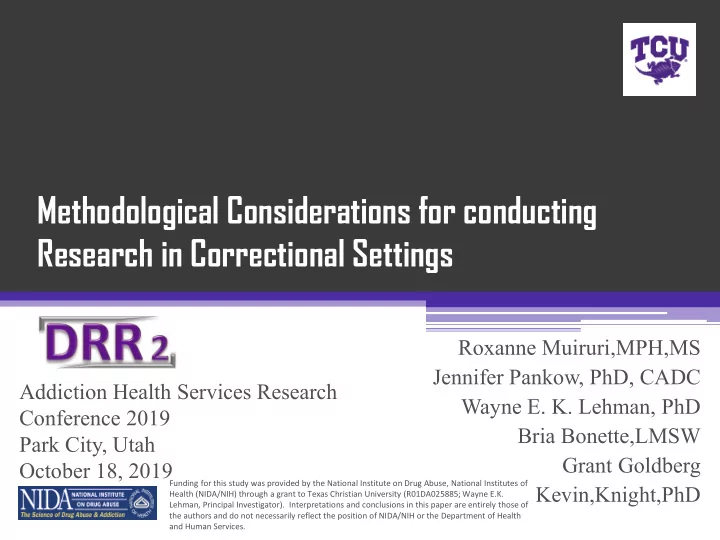

Methodological Considerations for conducting Research in Correctional Settings Roxanne Muiruri,MPH,MS Jennifer Pankow, PhD, CADC Addiction Health Services Research Wayne E. K. Lehman, PhD Conference 2019 Bria Bonette,LMSW Park City, Utah Grant Goldberg October 18, 2019 Funding for this study was provided by the National Institute on Drug Abuse, National Institutes of Kevin,Knight,PhD Health (NIDA/NIH) through a grant to Texas Christian University (R01DA025885; Wayne E.K. Lehman, Principal Investigator). Interpretations and conclusions in this paper are entirely those of the authors and do not necessarily reflect the position of NIDA/NIH or the Department of Health and Human Services.
Purpose • Report on experiences and challenges of conducting a research study in community and residential correctional settings. • Propose strategies for dealing with these challenges without compromise to the fidelity of study protocol .
Study Sites Community ( C ) Residential ( R ) SITE 1 SITE 3 • Single building with one floor • Male & female residents in separate secure facilities • Court mandated substance abuse • Court mandated outpatient treatment substance abuse treatment SITE 4 SITE 2 • Male & female residents housed • Large multi-story building with in different buildings programs on each floor • Open Campus • Meetings with POs and services delivered on different floors
Logistical Challenges Study Response Issues Building layouts Doubled up staffing to deal impacted recruiting with multiple floors efforts (C) Arrange for private Waiting rooms raised rooms; privacy concerns ( C & R ) converted consent forms into tablet based consent Advance the concept of Comprehension survey on voluntariness ( C & R ) tablet
Scheduling Challenges & Attrition Issues Study Response Communication disruption: Varied communication methods disconnected phone (text message, phone calls, service/number change ( C ) emails, and face-to-face) RAs provided participants with Study activity schedules & probation requirements (C & reminders & options to finish R) session after meetings Agency staff support Program service schedules frequently changed (C & R) Revocation of parole (C & R) Procedures to rejoin the study Absconding from site ( R )
Competing Priorities Issues Study Responses • Modified schedule from bi- •Participants coming out of correctional facilities had weekly to weekly Staysafe Family schedules sessions. New jobs • Modified schedule for follow- Probation requirements up surveys from 6 & 12 month Transportation schedule to 3 & 6 month •Challenging to adhere to • Increased compensation in multiple data collection Community setting for follow- meetings 15 (Exp) condition up surveys compared to 3 meetings in the Control
Things to consider ● Walkthrough Understand the perspective of the individual on probation before finalizing the intervention • Advisory group Establish an advisory group with representation of various agency roles early in the study • Contingency Plan Alternate site, Ability to follow-up on participant attrition • Checklists Tailored for sites differences ; with space to document any deviations from the study protocol; supports fidelity to the intervention
Questions?
Recommend
More recommend